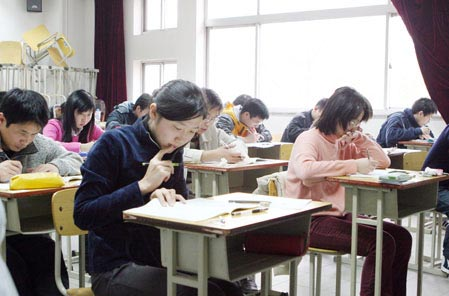Civil servant jobs require experience
Work experience will become a precondition for civil servant jobs in some big cities, as local governments decrease the recruitment of fresh graduates.
|
|
|
Applicants take the government recruitment examination on Jan 10.[File photo] |
Shanghai Civil Servant Bureau officials said on Wednesday that they will recruit 3,416 civil servants in 2010. More than 70 percent of those positions will be open only to those with grassroots work experience of two years or more, China National Radio (CNR) reported.
Grassroots work experience refers to work in government or party departments of towns, villages or sub-district offices, public institutions, companies, and communities. It also refers to those who have been self-employed or who have run individual businesses, the report quoted Fei Yuqing, an official from the bureau, as saying.
Hiring more people with grassroots work experience will improve the quality of civil servants, Fei said.
Beijing government officials also declared earlier this month that fresh graduates will be sidelined in civil servant recruitment in 2011.
The Beijing government wants 80 percent of its new civil servants recruited this year to have at least two years' work experience.
Fresh graduates could only apply for the positions at the village, town or sub-district level, and they could enter the upper level by civil servant recruitment examination or selection.
In 2009, Beijing was looking for just 50 percent of new recruits with work experience, with the other half being fresh graduates.
Similar reform in civil servants recruitment is also taking place in Guangdong province.
The provincial government said yesterday that by 2012, except for some special positions, all the civil servants will be selected from those having two years of grassroots work experience, including workers and farmers.
Dong Ming, a professor at the Chinese Academy of Governance, said the change is "good news" to improving government efficiency.
"The major job of civil servants is to serve the people, and those with work experience could fill the shoes more quickly," he said.
Recruitment reform is only one aspect of strengthening the administration vitality, Dong said. Reforming the management system of civil servants is even more important, he said.
"Civil service cannot be remarkably improved unless it does not mean secure employment any more," he said.
Chen Yu, director of the China Institute for Occupation Research at Peking University, said civil servants are using public resources to serve the public, so they should first understand the needs of the public.
"I don't think fresh graduates should change their seats in classrooms to seats in government organizations. Experience from grassroots levels will help them in their career path, no matter what they do in the future," he said.
A survey by China Youth Daily in late January shows that only 17 percent of people think "well-educated" is a precondition for being a good civil servant, but nearly 60 percent think more people in grassroots positions should be recruited to civil servant jobs.
 0
0 







